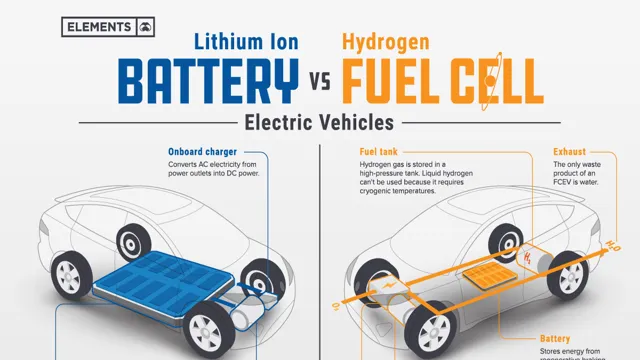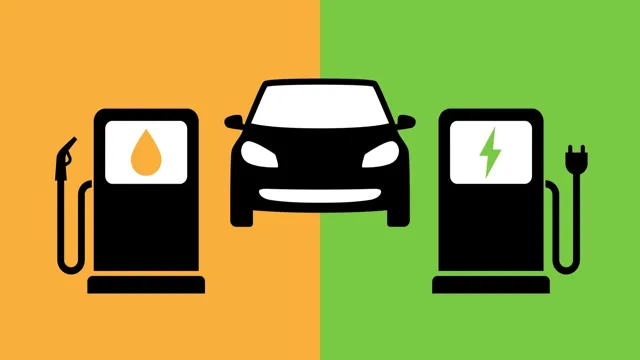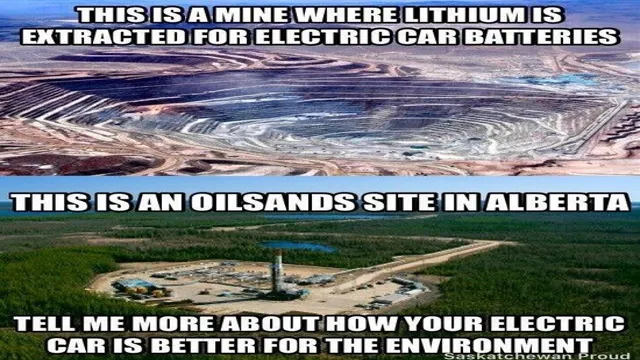Revving Up the Debate: Electric Car Battery vs Gas – Which One Reigns Supreme?
When it comes to choosing a vehicle, one of the biggest decisions you have to make is deciding whether to go for an electric or gas-powered car. One of the key factors that can influence your choice is the type of battery your car uses. Many people wonder which one is better – an electric or gas car battery.
In this blog post, we will delve into the differences between electric and gas car batteries, and how they impact your driving experience. Whether you’re a loyal gas-powered vehicle driver or considering making the switch to an electric vehicle, read on to learn more about the fascinating debate surrounding electric versus gas car batteries.
Environmental Impact
When it comes to environmental impact, electric car batteries have a clear advantage over gas-powered vehicles. For one, electric cars produce zero emissions while driving, compared to the significant amount of pollutants released by gasoline engines. Additionally, the materials used in electric car batteries are often recyclable, reducing the amount of waste produced by their disposal.
Gasoline engines, on the other hand, require oil extraction and refining, leading to detrimental effects on the environment. Overall, it’s clear that electric car batteries have a more sustainable and eco-friendly impact compared to their gas-powered counterparts. So, if you’re looking to minimize your environmental footprint, an electric car is definitely worth considering.
Electric battery emits less carbon than gas
Electric vehicles are becoming increasingly popular as a more environmentally-friendly option than gas-powered cars. The batteries used in these vehicles emit significantly less carbon than the combustion of fossil fuels in traditional vehicles. This is because the electricity used to charge the batteries can come from renewable sources like wind or solar energy, reducing their overall carbon footprint.
The impact of this shift to electric vehicles on the environment is significant, with estimates showing that the widespread adoption of electric cars could reduce global carbon emissions by up to 5 billion tons per year by 2050. This is a significant step towards slowing the rate of climate change and reducing the impact of human activity on the planet.
While some concerns have been raised about the environmental impact of producing electric car batteries, it is clear that they offer a more sustainable option for transportation in the long term.

Efficiency
When it comes to efficiency, there’s no denying that electric car batteries are superior to gas-powered engines. While gas engines waste energy through heat and exhaust, electric car batteries convert nearly all of their energy into motion. This means that electric cars can travel further on a single charge than gas cars can on a tank of fuel.
And with the rise of fast-charging and more efficient battery chemistries, the gap between electric car batteries and gas engines is only widening. Plus, electric cars have regenerative braking, which converts the vehicle’s momentum into energy that can be stored in the battery – something that gas engines simply can’t do. So, if you’re looking for the most efficient option, it’s clear that electric car batteries are the way to go.
Electric car battery conversion rate is higher than gas
Electric car battery conversion rate is higher than gas because of its inherent efficiency. Unlike gasoline engines where there is a lot of waste, electric cars convert almost all the stored energy into motion. Traditional gasoline-powered vehicles only convert about 25-30% of the fuel’s energy into motion, while the rest is wasted as heat.
This means that any extra energy pumped into the car’s engine simply dissipates into the air. On the other hand, electric cars make intelligent use of the battery’s stored energy by converting it into kinetic energy, which is then used to power the motors. Additionally, regenerative braking technology further boosts the efficiency of electric cars by converting the previously wasted energy from braking into rechargeable energy for the battery.
Therefore, the efficiency of electric car battery conversion is vastly superior to gas-powered cars, making them a more environmentally friendly choice for transportation.
Cost
When it comes to the cost of operating an electric car versus a gas-powered vehicle, there are a few things to consider. The upfront cost of purchasing an electric car can be higher than a gas car, mainly due to the cost of the battery. However, electric cars have significantly lower operating costs than gas cars.
One reason for this is that electricity is cheaper than gasoline. Also, electric cars require less maintenance, and their batteries last longer. On average, it costs about half as much to operate an electric car as a gas car.
Of course, this all depends on the length of your daily commute and the cost of electricity in your area. But overall, if you’re looking to save money in the long run, going electric is the way to go. Plus, not only will you be saving money, but you’ll also be helping the environment by reducing your carbon footprint.
Electric car battery costs more initially than a gas one
When it comes to buying a new car, one of the biggest factors to consider is the cost. And while electric cars have a lot of benefits, their battery cost can be a bit of a deterrent for some buyers. The truth is, electric car batteries do cost more initially than a gas one, but it’s important to look at the bigger picture.
Yes, you may have to spend more upfront, but you’ll likely save money in the long run because electric cars are more energy-efficient and require less maintenance. Plus, the cost of batteries is continuously dropping, as technology improves and production scales up. So, while it may seem like a hefty investment at first, it’s important to consider the long-term benefits and how they can save you money in the future.
If you think about it as an investment, rather than an expense, the higher cost of an electric car battery becomes more bearable.
Electric batteries save money in the long run as compared to gas
When it comes to the cost of owning a car, electric batteries prove to be more cost-efficient in the long run as compared to gasoline. Although electric cars may have a higher upfront cost, the savings on fuel and maintenance costs add up and create a significant difference over time. For example, electric vehicles have fewer moving parts, meaning less wear and tear and lower maintenance costs.
Additionally, the prices of electric batteries have decreased significantly over the years, making them more accessible and affordable to consumers. In contrast, gasoline prices, which fluctuate regularly, can make budgeting for fuel expenses a challenge. Overall, switching to an electric car can save you a substantial amount of money in the long term and also help to reduce carbon emissions.
So, why not make the switch and save some money while helping the environment?
Maintenance
When it comes to maintaining a vehicle, the type of fuel it uses can make a big difference. Electric car batteries require much less maintenance compared to gas-powered vehicles, which require regular oil changes, tune-ups, and emissions checks. With an electric car, there are no oil changes or filter replacements necessary, which not only saves time and money but is better for the environment.
Additionally, electric car batteries have a much longer lifespan than traditional car batteries, which require replacement every few years. While electric cars still require routine maintenance, such as tire rotations and brake pad replacements, they need far less overall attention than gas-powered cars. Overall, the lower maintenance requirements of electric cars make them a more convenient and cost-effective choice for those looking to reduce their carbon footprint.
Electric batteries require minimal maintenance compared to gas
When it comes to the maintenance of electric batteries and gas-powered engines, one thing is for sure; electric batteries require minimal maintenance compared to gas. With gas engines, users have to change the oil, spark plugs, and filters regularly. Over time, gas-powered engines are subject to wear and tear, which can lead to breakdowns and costly repairs.
On the other hand, electric batteries are much simpler and require little maintenance. They do not require oil changes or frequent check-ups, and there are no spark plugs or filters to worry about. Overall, electric batteries reduce the need for maintenance, which saves time and money for the user.
Moreover, electric batteries are also less complicated than gas engines, making them more reliable and durable. With fewer moving parts, electric batteries have a longer lifespan and are less likely to malfunction compared to gas engines. This reduces the risk of unexpected repairs, breakdowns, and downtime.
Additionally, electric batteries are environmentally friendly and do not emit harmful pollutants, making them a more sustainable option for those concerned with the environment. In conclusion, electric batteries are the future of energy storage as they require minimal maintenance, provide reliable performance, and offer a sustainable alternative to gas-powered engines. While gas-powered engines may have their advantages, they come with higher maintenance costs, more complicated systems, and environmental concerns.
Therefore, electric batteries are a better long-term investment, delivering more cost savings, convenience, and peace of mind.
Gas batteries may require tune-up more often
Gas batteries, also known as hybrid batteries, require regular tune-ups to maintain their efficiency and longevity. These batteries have both an internal combustion engine and an electric motor, making them more complex than traditional car batteries. Due to this complexity, gas batteries may need maintenance more often, especially if they are not properly maintained.
Regular tune-ups can help ensure that the battery is functioning correctly, and any issues can be addressed before they become more severe. While this may require additional time and money, the benefits of a well-maintained gas battery can be significant, including better fuel economy and a longer lifespan. Remember, just like any other car component, it’s important to take care of your gas battery to keep your vehicle running smoothly.
Conclusion
After weighing the pros and cons of electric car batteries versus gas, it’s clear that the electric car battery is the true winner in terms of environmental impact and long-term cost efficiency. While gas engines may have once been the talk of the town, the future is electric and we’re charged up for what’s to come. So let’s rev up our electric engines and leave the gas guzzlers in the dust!”
FAQs
What is the main difference between an electric car battery and a gas engine?
The main difference between an electric car battery and a gas engine is that the battery is used to power an electric motor, while a gas engine uses fuel to power its combustion engine.
How long does it take to charge an electric car battery compared to filling up a gas tank?
Charging an electric car battery can take anywhere from a few hours to overnight, depending on the charging level and battery capacity. Filling up a gas tank typically takes a few minutes.
Are electric car batteries more expensive to replace than a gas engine?
Electric car batteries can be more expensive to replace than a gas engine, as they are a newer and more advanced technology. However, with advancements in battery technology and increased demand, prices are expected to decrease over time.
How does the environmental impact of electric car batteries compare to gas engines?
The production and disposal of electric car batteries can have a significant environmental impact, but electric cars produce far fewer emissions while driving than gas engines. Overall, the environmental impact varies depending on factors such as energy sources for charging and battery recycling.




